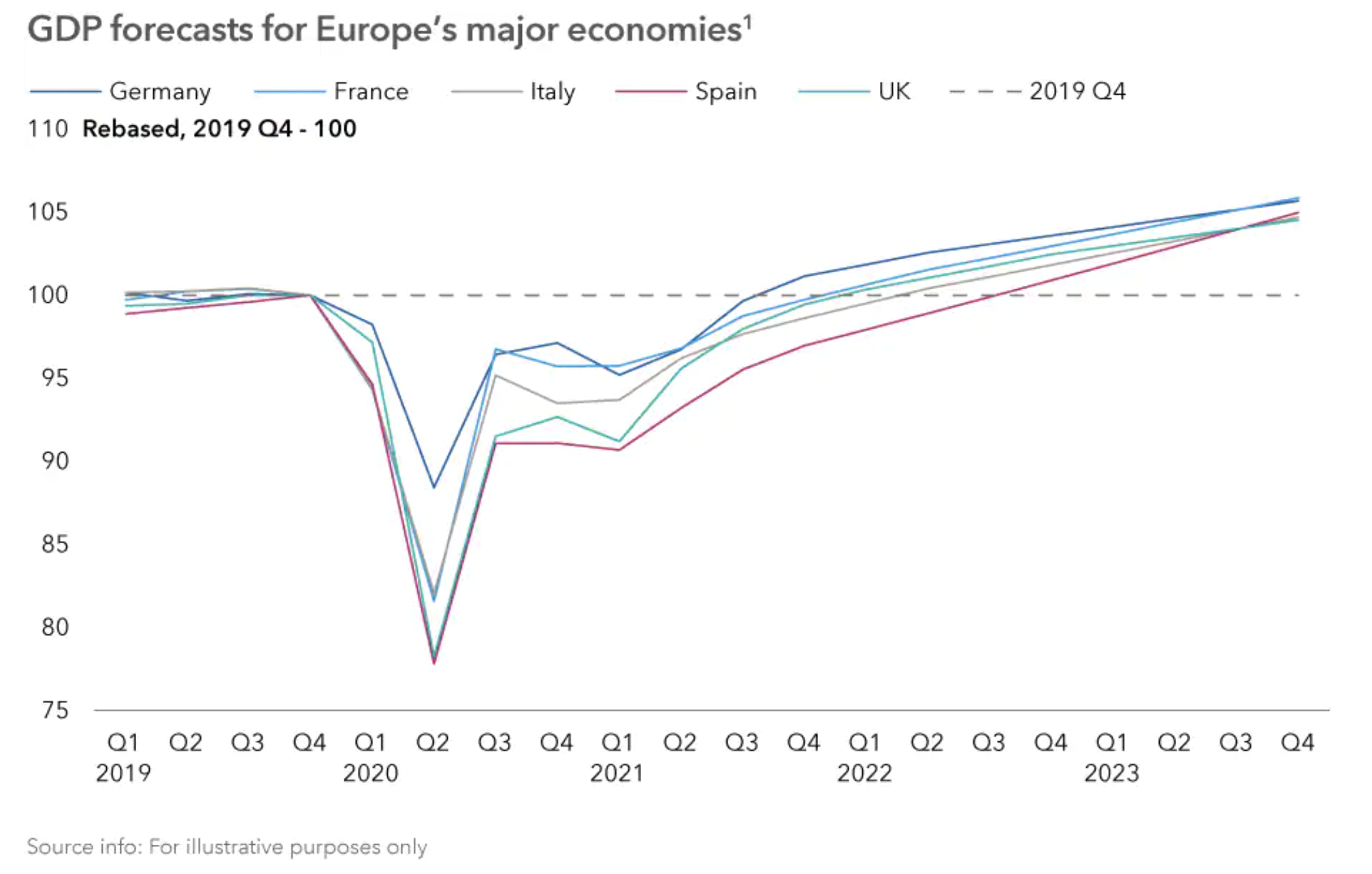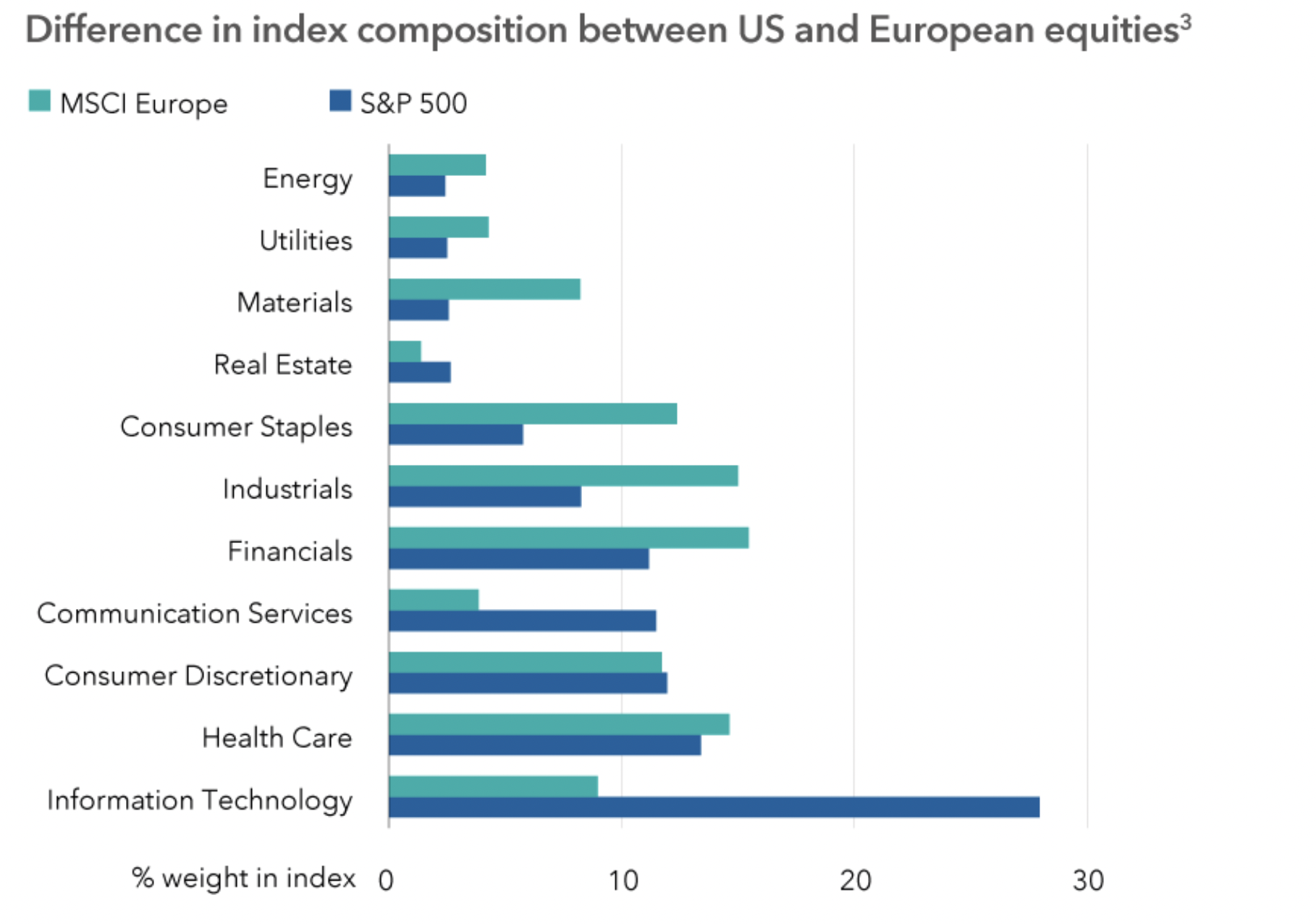Mood lifts in Europe as people start moving again

Capital Group
The backdrop for Europe is increasingly positive, but there are risks that warrant caution. The economic recovery is well underway: gross domestic product growth in Europe’s major economies was stronger than expected in the second quarter, notably in Italy and Spain.
As European economies open up, services activity has recovered sharply, boosted by mobility restrictions easing. This is particularly important for economies such as Italy and Spain that rely on tourism and hospitality.
Manufacturing activity also continues to expand, powering recovery in the eurozone. Capital Group economist Robert Lind believes Europe’s major economies could regain their pre-pandemic GDP levels earlier than expected.

With governments protecting household incomes and consumers unable to maintain their usual levels of consumption, saving rates have jumped. This could trigger a release of pent-up consumer demand, benefitting many companies. We are starting to see early evidence of this with retail sales and consumer confidence becoming more buoyant.
Amid the greater optimism about an economic recovery coupled with strong corporate earnings, European equities have recorded strong gains so far in 2021.
The MSCI Europe Index has delivered seven straight months of positive returns, rising nearly 20%2 in euro terms for the year to date, although past results are not a guarantee of future results.
We may see slower growth ahead
However, Lind believes there are two key headwinds, which mean growth is likely to moderate during the rest of the year.
1. The rapid spread of the Delta coronavirus variant could undermine the recovery, particularly through the autumn, though governments appear reluctant to re-impose tight lockdowns.
There have been divergent experiences in Europe’s largest countries through the summer. Spain’s latest upsurge in cases has encouraged a marked acceleration in vaccinations. In France, authorities have responded by tightening some restrictions again to compensate for slower progress in vaccinations. So far, Italy and Germany have experienced lower case
rates as governments have been cautious in loosening restrictions. They have sustained their vaccination programmes though there has been a slowdown recently.
In the UK, infection rates have risen and the pace of vaccinations has dropped markedly. While the government has continued to ease restrictions, there are signs that people are still cautious in their behaviour and this has undermined economic growth somewhat over the summer. The UK’s experiment suggests that if there is another wave of infections through the autumn, there are downside risks to economic growth either in response to tighter government restrictions or because of a persistent change in behaviour by consumers/companies.
2. There are increasing concerns that growth in the US and China might have peaked already. The European economy may find it hard to escape this gravitational pull from its largest trading partners.
The trajectory of the virus and vaccinations in the US is no longer developing in a way that is consistent with the forecast of a return to normalcy in the domestic economy by year-end 2021. We are beginning to see some reopening measures being reversed in certain parts of the country, and while the steps taken may be minor, the direction of travel has clearly changed. This suggests that the return to equilibrium – where the supply and demand for goods, services, and labour is more in balance – will likely be delayed, and the “distortions” – primarily higher inflation – are more likely to persist.
In China, recent economic data has been weak with growth retreating more quickly then expected as the Delta variant and floods disrupted business operations. With an industrial slowdown already happening, and the likelihood of the consumer sector being hit further on the back of the COVID Delta wave, it is probable that China’s economy will weaken in the second half of this year.
Valuations should insulate European equity markets
The European stock market has lagged the US over the last 13 years. One reason is that after the global financial crisis, the US economy recovered more quickly, supported by monetary policy and quantitative easing. In contrast, Europe took a more conservative approach of fiscal discipline, resulting in diverging economic paths.
Also, the index composition of the S&P 500 is materially different to MSCI Europe.
MSCI Europe has greater weightings towards energy, materials, utilities and financials sectors compared to the S&P 500, where the information technology and communication services sectors have a higher weighting.
Over the last decade, technology giants such as Alphabet, Apple, Amazon, Facebook and Microsoft have driven US and global equity returns, underpinned by strong earnings growth. Cyclical sectors such as energy, materials, industrials and financials, which dominate the European index, have underperformed over the same period and experienced lower earnings growth, causing the relative earnings growth and return differential.

Despite the uncertain backdrop, we believe it is possible to find a large range of interesting longer-term investment opportunities among Europe-listed equities. The slowdown in the economy and corporate earnings is likely to be mild and the major European economies and markets should continue to benefit from the loosening of mobility restrictions.
In particular, select companies in the sectors listed below have been resilient against the backdrop of the pandemic and have continued to adapt and navigate the changing economic and market environment.
• Online and bricks-and-mortar betting and gaming companies may continue to benefit from online gaming, the reopening of betting shops on the local high street and a summer of sporting events.
• Online retailers such as Ocado may also continue to do well in a post-COVID world. The shift to online grocery shopping looks set to continue given retail sub-sectors remain highly underpenetrated in Europe.
• Luxury goods are likely to get a substantial boost due to pent-up demand. European firms such as LVMH, Richemont and Kering dominate this market, and Chinese consumers are driving much of the growth. Although recent news regarding China’s wealth redistribution initiatives have caused shares to decline, our analyst believes certain companies in the sector remain long-term buying opportunities.
• Industrials such as aerospace and defence companies will be beneficiaries as international travel resumes and the production of aircraft ramps up again for Boeing and Airbus.
• Utilities are likely to benefit as many countries in Europe are boosting clean energy as part of their post-pandemic economic stimulus funding. The fundamentals of Europe’s largest clean energy companies remain strong.
Put today’s investment insights into a long-term perspective
Capital Group believes in a smarter way of investing that combines individuality and teamwork into a tailored approach to help investors meet their goals. For more insights click 'FOLLOW' below.
1. As at August 2021. Sources: Bundesbank, INSEE, ISTAT, INE, CG predictions.
2. As at 30 August 2021. Source: MSCI
3. Data as at 31 March 2021. Source: Factset
4 topics
1 contributor mentioned

Matt Reynolds is an Investment Director at Capital Group. He has over 20 years of industry experience including head of Australian equities – core at Colonial First State Global Asset Management. He holds a bachelor's degree in Economics from The...
Expertise

Matt Reynolds is an Investment Director at Capital Group. He has over 20 years of industry experience including head of Australian equities – core at Colonial First State Global Asset Management. He holds a bachelor's degree in Economics from The...
